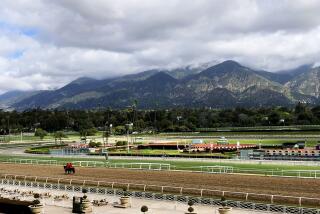Racing Industry Suffers Setback on Internet Gambling Legislation
- Share via
The thoroughbred industry’s support of the Internet Gambling Prohibition Act verifies the adage that politics creates strange bedfellows. Racing has found itself allied with groups on the Christian right that consider gambling a moral evil, with legislators who pander to the anti-gambling forces and with casino interests trying to squash their competition.
Unfortunately for the sport, another of life’s truths may be operative: when you get into bed with the wrong companion, you often regret it in the morning.
The Internet bill suffered a setback in the House last week and its fate is uncertain. But racing now seems unlikely to get what it wanted most--a clear affirmation that interstate telephone wagering is legal--despite its efforts to work with opponents of gambling.
A prominent industry leader, Stan Bergstein, executive director of the Harness Tracks of America, offered this assessment: “Racing gambled on compromise and may have lost. If so, it faces the possibility of gambling in the courts with the outcome uncertain as well. Where that path leads could be fraught with more danger.”
The Internet Gambling Prohibition Act, sponsored by Sen. Jon Kyl, R-Ariz., should have been repugnant to everyone in the racing business as well as to most rational Americans. In the free environment of the Internet, users can obtain whatever they want: pornography of almost any type, instructions for building bombs, manifestos of neo-Nazi hate groups. Libertarians would argue that even such odious material doesn’t justify use of the federal government’s power to restrict individuals’ freedom. But in the view of the Kyl bill, there is one particular threat that requires heavy-handed federal regulation of the Internet: the danger that citizens might place a bet via their computers.
The original language of the Kyl bill was so sweeping that it might have banned the interstate simulcasting that now generates most of racing’s revenue. The industry had to get involved in this political fight; instead of opposing the bill, the American Horse Council secured language in it that clarified the legality of the sport’s current practices. It stated that an interstate bet is legal if it is legal in the state where it is received--the premise upon which telephone-betting services are currently operating. When the Kyl bill sailed through the Senate, racing seemed on the verge of a political triumph.
In the House, however, racing’s exemption from the Internet gambling ban came under fire from critics who thought the measure might actually expand wagering. To save the bill, Rep. Billy Tauzin, R-La., inserted language in the House version that allows “otherwise lawful, state-regulated parimutuel wagering . . . provided that the type of wagering has been authorized by the state.” This was deliberately ambiguous; it is not certain that interstate telephone betting is lawful now. (The Justice Department says it is not.) However, the American Horse Council declared that it was satisfied with this compromise because it believes that the Interstate Simulcasting Act of 1978 sanctioned the sport’s current interstate wagering practices. But Tauzin himself indicated that any uncertainties might have to be resolved by the courts.
The bill, with Tauzin’s language, came to the floor of the House under a rule that prohibited amendments but required a two-thirds vote to pass. Some foes thought it was still too generous to the racing industry and the opponents included the White House, which issued a statement that declared: “The Administration is especially troubled by the exemptions included in the bill for parimutuel wagering. . . . These exemptions could have the effect of allowing individuals to bet on dog and horse races from their homes.” Although 60% of the House supported it, the bill fell short of the two-thirds majority it needed.
Anti-gambling sentiment in the House is strong. It is also inconsistent and hypocritical in many cases. Politicians who condemn gambling almost never take a stand against their own state governments’ operation of lotteries--the most exploitative of all gambling games. Politicians concerned about the intrusion of gambling into the home never mention that a multibillion-dollar gambling game--day-trading in the stock market--thrives on the Internet and dwarfs in scale anything the parimutuel industry could dream of. Republicans profess to oppose expansion of Washington’s powers, yet they are the ones pushing hardest for federal regulation in an area that has been traditionally controlled by the states.
This is a dangerous environment for horse racing and it is unclear what will happen to the bill when Congress reconvenes in the fall. Jay Hickey, president of the American Horse Council, said, “We hope to get it back to the floor (of the House) as soon as possible. But the time is short.”
If the bill is considered again, however, it might be subjected to amendments and it is possible that some proposed amendments would strip away any language deemed favorable to horse racing. Since taking a stand against gambling has become as popular as beating up on the tobacco industry, racetrack betting is unlikely to have many vocal supporters.
More to Read
Go beyond the scoreboard
Get the latest on L.A.'s teams in the daily Sports Report newsletter.
You may occasionally receive promotional content from the Los Angeles Times.










